|
| George Walton of Georgia |
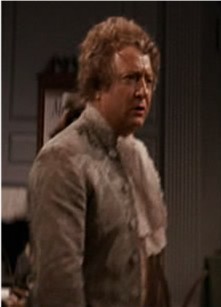
|
"Will someone shut that man up?" ~ George Walton (GA)
Walton, played by Barry O’Hara, can be seen hanging out with the southern delegates
and seated next to the Georgia table (usually on the right). In the opening, he is
wearing a green coat and tan (possibly moss green) waistcoat. He is the easiest of the Silent Men of Congress to pick out
because he does have a single line, as quoted above. There is another GA delegate, in very-easy-to-spot red, but he is not
listed on imdb. He might be Button Gwinnett because historically speaking he was the only other GA delegate to sign the Declaration
of Independence. I don’t know.
I would like to thank www.imdb.com for their 1776 site and the list of uncredited cast members.
| Thomas Hayward, Jr. |
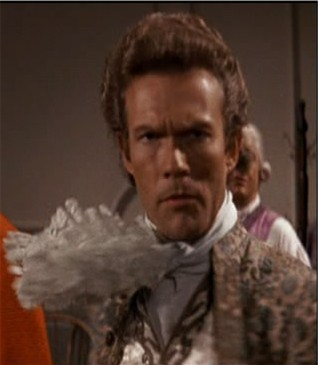
|
Since I started with Georgia,
I’ll work my way north. South Carolina’s silent
delegates were easy thanks to imdb and their picture of William Bassett, who plays Thomas Hayward, Jr. By comparing pictures,
he was easy to spot. He is most identifiable by the light blue ribbon he has in his hair in the opening. He is wearing a green
print/white background (it looks green anyway) coat and grey breeches (they’re hard to pick out, though) and he is often
seated on the left side of the three SC delegates. The SC delegate in the middle is, by probable process of elimination, Thomas
Lynch, Jr. played by Gordon Devol. He is wearing a brown coat and a shiny brown waistcoat. The SC delegate on the right is
very easily known as Edward Rutledge.
North Carolina’s Silent Men are William Hooper and John Penn,
played by Jordan Rhodes and Jack De Mave, respectfully. William Hooper wearing pink with a white wig in the beginning of the
movie. In the picture below, he is third from the left. Therefore, second from the left is John Penn. Thank you to John Costello
in my guestbook and www.jordanrhodes.com for the information.
| Too good a shot to pass up-R-L:Button Gwinnett(GA) |
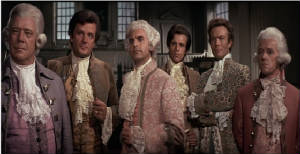
|
| R-L Cont.:Thomas Hayward, Jr.,Thomas Lynch,Jr.(SC);William Hooper,John Penn,Joseph Hewes(NC) |
Continuing
to move north, we arrive in Virginia. Maybe it’s just people in Virginia
are loud, or they’re just that important, but there are no Silent Men of
Virginia.
Ahem. Next is Maryland
then. There are two Silent Men of Maryland in the movie. According to imdb, they are William Paca and Charles Carroll (of
Carrollton), played by Andy Albin and Herber Jentzsch. With
the resources I have, I can’t tell which is which, but I have a nice picture of both of them with Samuel Chase
(and part of the New Jersey delegation). Now, historically speaking, Charles Carroll didn’t join the congress
until July 18th, making him too late to vote but not too late to sign - and so actually shouldn’t appear
in the movie.[1] The third member of the delegation should be Thomas Stone. Oh well.
[Update 10-15-2009]: When I was watching
1776 again it struck me that in the scene where Adams is trying to convince Samuel
Chase to go with him to New Brunswick there is a line I can not contribute to anyone accurately. The line comes in after Adams
says “Come with me to New Brunswick and see for yourself,” other congressmen say three lines, and Adams says,
“What do you say, Chase?” The line is there, “Go ahead Sam, sounds lively as Hell up there.” The script
book of the musical I have credits this line to Morris (NY) but I don’t think that is him in the movie saying this line.
The reason why I put this information here is that the Silent Men of Maryland are sitting near Chase in this scene. I’m
not sure if it is one of them who says this line, but it is possible one of them is not so silent. I also have reasons to
think it is Rev. Witherspoon who says it - it sort of sounds like him and he too is near Chase and Adams during this exchange.
I welcome people’s opinions and arguments on this matter.
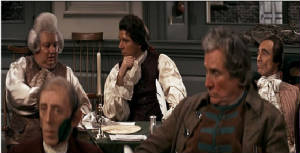
Moving
up north… Next is Delaware. All three delegates have speaking lines, so there are no Silent Men of Delaware
(the three could either fight or not talk at all. They evidently
decided to let everyone know they are not tria juncta in uno).
The same goes for Pennsylvania (though for much of the movie, James
Wilson gets cut off by Dickinson a lot, and could be considered a Silent Man… oh, that’s mean… sorry Dickinson.
Also, Dickinson and Franklin don't talk to each other much,
do they?).
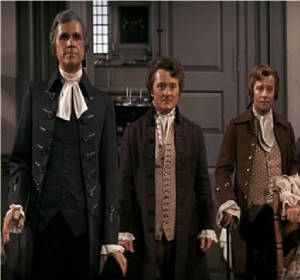
|
| L-R: Rev. John Witherspoon, Francis Hopkinson, Richard Stockton (NJ) |
Next up is New Jersey. Ah, the latecomers…
Not their fault. Anyway, there are two Silent Men of New Jersey who are ridiculously easy to spot and name - Francis Hopkinson
and Richard Stockton. Rev. John Witherspoon introduces them order, therefore they are played by Dick O’Shea and Fred
Slyter, respectfully.
Who’s next? Oh, yes, New York. There is one Silent Man from New York (Woah, there are silent men in
New York? Just kidding…) The one Silent Man of New York is Francis
Lewis played by Richard McMurray [imdb.com]. He is easy to spot when seated next to Livingston and Morris at New York’s
table.
| On the left - Francis Lewis of New York |
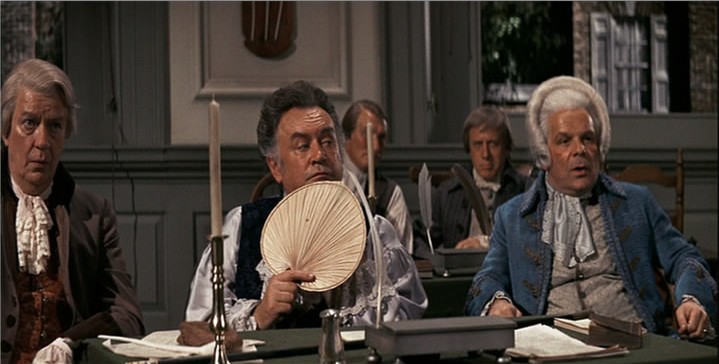
|
| I was too lazy to try to find a better shot of him... |
Alright then. Connecticut has two Silent
Men: Samuel Huntington and Oliver Wolcott played by Frederic Downs
and Peter Forster respectfully. It took some work to figure out who was who, but my best guess is Huntington (Downs) is on
the left and Wolcott (Forster) is on the right. If anyone knows this to be incorrect, let me know! Also, in this picture, Roger Sherman is, of course, the one walking behind them.
| Silent Men of Connecticut |
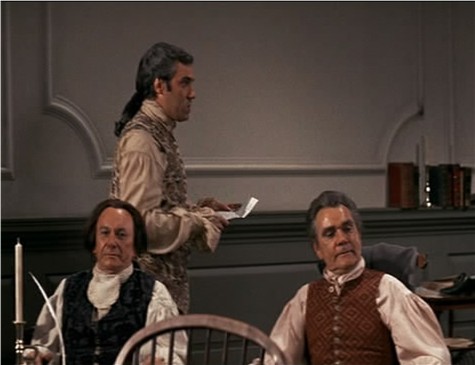
|
| L: Samuel Huntington; R: Oliver Wolcott; background: Roger Sherman |
Rhode Island: What can I say except Stephen
Hopkins is a one man show. So in representing Rhode Island, he goes solo. And that is enough, trust
me - I am positive Mr. McNair is happy Hopkins is one-of-a-kind…
“McNair, fetch me a rum!”
Massachusetts: Again, when you have someone like Adams in your delegation, anyone else would
be overkill. Adams is obnoxious and disliked enough as it is, he doesn’t need anyone
else scaring away the other delegates in Congress… hahaha - We love you, Mr. Adams!
[With the above comments
regarding RI and MA, I do not mean to discount the importance the other delegates each colony had in real life.]
| Silent Man of New Hampshire |
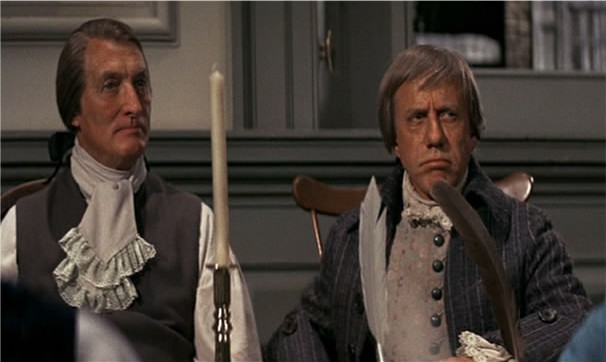
|
| L: William Whipple; R: Dr. Josiah Bartlett |
Ahem, anyway… so the last and most
northerly colony is New Hampshire, which has one Silent Man. His name is William Whipple, played by John Holland [imdb.com].
Obviously he is easiest to spot when he’s near Dr. Josiah Bartlett, but I also spotted him near the Maryland delegates.
So… That’s it for the Silent
Men of Congress page. Finally it is done. I was impressed with the reactions people had to this page (all positive reactions,
I assure you). I am happy to see people (can I call you fans of my site?) are onboard with my idea and like this page. I know
it has been a long time in the making, as is much of this site, but now that it is done, I will keep it up for as long as
I can for all of you to (hopefully) enjoy!
[1] Lewis
Alexander Leonard, Life of Charles Carroll of Carrollton, (New York: Moffat, Yard
and Co., 1918), pg. 125. I accept this source because, despite its age, Leonard clams to have used the papers of Charles Carrollton
of Carrollton and other primary documents. See also Benson John Lossing, The Declaration of Independence with Short Biographies
of its Signers. Biographies condensed in reprint. (Bedford, MA: Applewood Books, 1996), p. 27.
|



